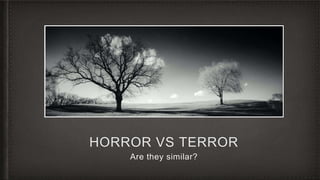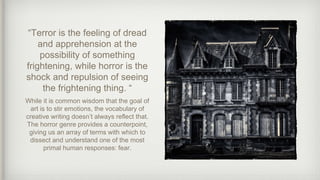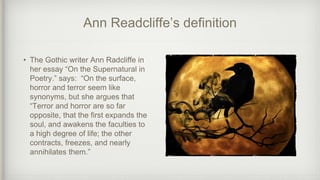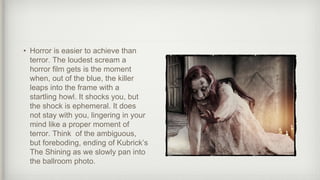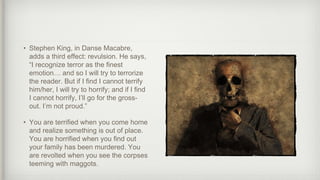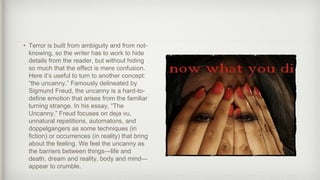Horror
- 1. HORROR VS TERROR Are they similar?
- 2. âTerror is the feeling of dread and apprehension at the possibility of something frightening, while horror is the shock and repulsion of seeing the frightening thing. â While it is common wisdom that the goal of art is to stir emotions, the vocabulary of creative writing doesnât always reflect that. The horror genre provides a counterpoint, giving us an array of terms with which to dissect and understand one of the most primal human responses: fear.
- 3. Ann Readcliffeâs definition âĒ The Gothic writer Ann Radcliffe in her essay âOn the Supernatural in Poetry.â says: âOn the surface, horror and terror seem like synonyms, but she argues that âTerror and horror are so far opposite, that the first expands the soul, and awakens the faculties to a high degree of life; the other contracts, freezes, and nearly annihilates them.â
- 4. âĒ For instance, terror is the sounds of unknown creatures scratching at the door; horror is seeing your roommate eaten alive by giant rats. Terror is the feeling a stranger may be hiding behind the door; horror is the squirt of blood as the strangerâs knife sinks in. âĒ Many of the most iconic moments in horror fiction are driven by terror. They are partially obscured, letting our minds swell with tension and dread.
- 5. âĒ Why does terror enliven us while horror deadens? For Radcliffe, terror in its ambiguity moves us toward yet another effect: âthe sublimeâ : the confused awe at greatness and darkness our mind canât grasp. We are both attracted and repelled by it. âĒ To Edmund Burkeâwhose philosophy Radcliffe referencesâit is âthe strongest emotion which the mind is capable of feeling.â The sublime is often associated with natureâthink hurricanes, looming mountains, the infinite expanse of the seaâyet it is particularly effective in art. This is because the mind requires a little distance to feel the sublime.
- 6. âĒ Horror is easier to achieve than terror. The loudest scream a horror film gets is the moment when, out of the blue, the killer leaps into the frame with a startling howl. It shocks you, but the shock is ephemeral. It does not stay with you, lingering in your mind like a proper moment of terror. Think of the ambiguous, but foreboding, ending of Kubrickâs The Shining as we slowly pan into the ballroom photo.
- 7. âĒ Stephen King, in Danse Macabre, adds a third effect: revulsion. He says, âI recognize terror as the finest emotionâĶ and so I will try to terrorize the reader. But if I find I cannot terrify him/her, I will try to horrify; and if I find I cannot horrify, Iâll go for the gross- out. Iâm not proud.â âĒ You are terrified when you come home and realize something is out of place. You are horrified when you find out your family has been murdered. You are revolted when you see the corpses teeming with maggots.
- 8. âĒ Terror is built from ambiguity and from not- knowing, so the writer has to work to hide details from the reader, but without hiding so much that the effect is mere confusion. Here itâs useful to turn to another concept: âthe uncanny.â Famously delineated by Sigmund Freud, the uncanny is a hard-to- define emotion that arises from the familiar turning strange. In his essay, âThe Uncanny,â Freud focuses on deja vu, unnatural repetitions, automatons, and doppelgangers as some techniques (in fiction) or occurrences (in reality) that bring about the feeling. We feel the uncanny as the barriers between thingsâlife and death, dream and reality, body and mindâ appear to crumble.
- 9. âĒ In German, Freud connects the termâunheimlichâto the concept of not belonging to the house. Haunted house stories often elicit the uncanny as the protagonists discover secret passageways and boarded-up rooms. The idea that oneâs own home could have dark, hidden secrets produces uncanny unease.

